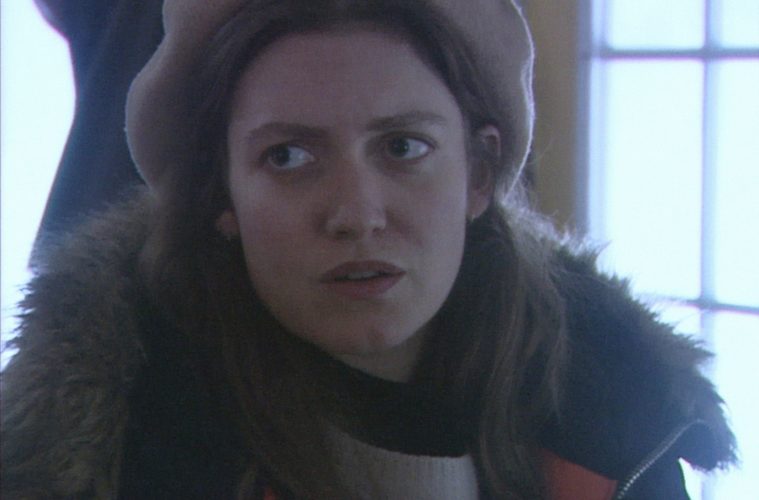In the new feature film The Plagiarists a young, white, highly educated couple on their way home from a weekend getaway have car trouble and find themselves stranded on the side of a snowy, secluded road. They are soon discovered by an enigmatic and charming stranger, who is black. He offers to call a friend who can fix their car. He then invites them to stay the night.

The Plagiarists was directed by Peter Parlow and was co-written by James N. Kienitz Wilkins and Robin Schavoir, who each seem to have taken great pleasure in concocting this slippery set-up. The opening of their film suggests a horror movie but it soon becomes apparent that Parlow is more interested in putting their characters’ progressive, middle-class sensibilities under the microscope, at least for the first while. The lovers are named Anna (Lucy Kaminsky) and Tyler (Eamon Monaghan)–a novelist without a novel and a filmmaker without a film, respectively. The man offering to help them is named Clip (played by the silky voiced Michael “Clip” Payne, a sometimes singer and pianist for Funkadelic), a 50-something year old who turns out to have a closet full of old video equipment in his home and–inexplicably–a young boy in a dark upstairs room who is glued to an iPad.
Were The Plagiarists merely this observation of liberal minds in duress it would have made for a more than enjoyable watch but with credit to Kienitz and Wilkins’ terrific script, it becomes more nuanced and haunting only after that first act. Indeed, the film’s title alludes to an encompassing obsession with authenticity–as first seen in Anna’s self doubt regarding her writing as well as in Tyler’s platitudes about the superiority of video equipment over digital. It is a mood that reaches a quietly surreal peak at around the halfway point, although to divulge any details of that sequence would simply ruin the fun. Suffice to say that the film offers something to chew on about realness and the manner in which artists revere it. Indeed, even the echoes of Get Out in the opening moments do not go unnoticed by Parlow, who alludes to Jordan Peele’s horror smash with a line of dialogue early in the first act.

The director shoots handheld (so real!) with a sort of stilted, staccato editing, and draws naturalistic performances from his cast. It is an aesthetic many will recall from the unjustly reviled mumblecore films of the early ‘00s or, more appropriately in this case, their more unsettling mumblegore cousins. Tyler comes across the closet of old video equipment in Clip’s house and takes to playing around with it. Parlow then cuts to Tyler’s camera’s POV to give the image the quality of found footage horror. As the narrative plays out it becomes eerily difficult to discern who exactly is behind the camera.
What’s even more eerie is the character of Clip, who hangs over Anna and Tyler like a specter despite only appearing in a handful of scenes. The early moments suggest the man might be trying to seduce Anna but later that night she listens to him having sex in an adjoining room. Kaminsky plays the moment brilliantly, holding her cards close to the chest, almost with a hint of disappointment in her eyes. Monaghan is just as good as Tyler, playing the film bro role to a T with his narcissism and humble-brag references to Dogme ‘95. Now there was a collective who knew a thing or two about realness… at least for a while.
The Plagiarists premiered at the Berlin International Film Festival and opens on June 28.

